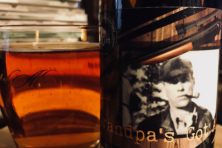Grandpa
- Share
- Tweet
- Pin
- Share
It’s been 32 years since I’ve lived on my family’s dairy farm. I drove past my old home last week; I pulled the car over and parked in the gravel on the shoulder of the road to get a better look. The cow pasture is overgrown with burdock and thistle, and the gambrel barn roof needs shingling. The haymow door is hanging off its track; a corner rests on the ground. The mow, once stacked to the rafters with hay bales and mountains of straw, looks empty. Weeds grow around the farmhouse not the lilacs, roses, and gladiolas my mother fussed over. The machine-shed roof sags; a rusty manure spreader is parked inside the open door. I hear Don McLean’s lilting tenor on my car radio. His hit song “American Pie” brings back vivid memories of farm life and conversations with Grandpa.
It is late June 1971. I am peddling my hand-me-down red and white Schwinn back and forth in front of the machine shed door. Don McLean’s ode to days gone by is playing through the static on the AM/FM radio perched on top of the tool bench in the shed. I squint into the doorway. I can see the muck covered soles of Grandpa’s barn boots sticking out from underneath the New Holland hay combine; a service manual and crankshaft parts are scattered over the oil stained floor. The musty smell of dirt mingles with spilled coolants and diesel oil.
Since Grandpa has been working on the haybine for the better part of the morning he probably wants some company, so I lean my old Schwinn against the workbench in the shed and sit cross-legged on the cool cement floor next to his boots. I discuss my usual topic with him – the various injustices I am forced to endure because fate dealt me an unfortunate hand – I was born into a family of dairy farmers. I describe the horror of going to school with BioWay iodine udder wash staining my fingertips. “Everyone knows I milk cows before school Grandpa,” I whine. Unfazed by broken baler parts scattered around me, and thunderheads gathering in a darkening sky, I continue. “My barn boot farmer tan makes me look ridiculous in my pom-pon uniform.” I strategically save my field stone picking complaint and solution to the farmer tan issue for last. I begin by comparing the annual ritual of tromping through acres of dusty plow rows, picking rocks forced to the field surface by frost, with the elements of slavery that inspired umpteen Negro spirituals. I finish with a simple, yet brilliant, idea: I should drive the tractor during rock picking. This means I can wear a swimming suit, shorts, and flip flops rather than clomping around the field in my barn shoes and overalls looking like a muddy booted yokel. “This is a win-win situation Grandpa. I won’t have a gross farmer tan, and I’m still helping you with chores.”
Grandpa slides out from beneath the baler dragging his wrenches and a grease gun with him. He lifts the brim of his Allis Chalmers cap with grime-covered fingers and mops his grease streaked face with a blue paisley handkerchief. He pulls his silver watch from the front pocket of his bib overalls; he flips open the lid to check the time. There is a long, meaningful pause. Finally, he answers: “Gosh all fishhooks, you kids are enough to drive a man crazy.” Grandpa is a man of few words. He turns toward the barn, and he hobbles away walking the bow-legged walk of a man who has spent the last 70 years milking cows.
Timing is everything. When the weatherman is promising strong storms, and acres of first cutting hay are lying on the field, even the most patient farmers get a little edgy. I decide to keep my personal complaints to a minimum until the hay is in the barn. I hop on my Schwinn and follow Grandpa.
I drop my bike next to the barn and traipse behind him into the milk house; the smell of chlorine pipeline sanitizers and calf milk replacer greets us. He pushes open the swinging double doors into the cow barn. The cool darkness is a welcome relief from the mid-morning heat; humidity beads like sweat on the whitewashed barn walls. A cat peeps out at us from under the feed cart, and an enormous fly sizzles in the fly zapper. “We better get the cows in before it storms,” Grandpa announces. He claps his calloused hands together and shouts, “Come boss, come boss!” The cows, without the slightest sense of urgency, wander toward Grandpa; single file, they lumber into the barn and to their stalls. Thunder rumbles in the distance; the air is stifling. Grandpa and I look out the south barn door. We watch in silence as a wall of rain moves across the hay field. I worry aloud that the first cutting will be ruined. “Oh well. What’s a man to do? ” Grandpa asks.
I got back into my car, turned the ignition key, and slowly pulled away from the farm. Smiling to myself, I remember another conversation with Grandpa. It was my last summer on the farm before leaving for college. We were unloading our seventh hay wagon of the day. I told Grandpa that if I was going to work like a slave I expected to see some cold, hard cash for my efforts. Grandpa looked at me over the top of his chafe-covered glasses and said, “If I had a dime for every bale I lifted I’d be a rich man – not necessarily a happy man. It’s your thinking, Susie, not your circumstances, that makes you miserable.” After a few minutes he added, “You’re going to miss unloading hay wagons with me after you move away.” He was right.
Sue Erdmann is a freelance writer living in southeastern Wisconsin.

